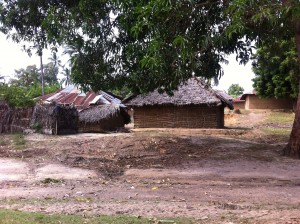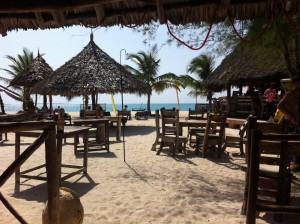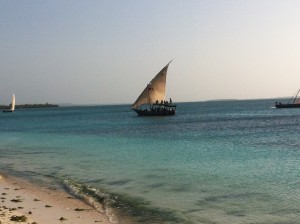I’ve now been in Zanzibar for a month and a half. This isn’t going to be a structured blog post, but rather a series of reflections:
Last weekend I had the magical experience of sitting in the Indian Ocean looking up at a brilliant sky filled with stars. Moving my legs and arms under water, I could leave trails of glowing phosphorescence.
The date shakes in the little store by Darajani are my favorite things to eat/drink in Zanzibar. The owner puts yogurt, peanuts, honey and cardamom in a glass, mixes it all up and then pours in milky date juice. You give it a final stir and eat it with a spoon.
My Swahili is still miserable. I seem to have hit a wall. I’m picking up lots of words but my tongue still gets tied when I attempt to articulate a sentence. I need to spend more time practicing, but I’m just exhausted every day after work…
I have been going for an afternoon swim every day after work at the nice sandy beach on the southern side of the Stone Town peninsula. It’s great to watch the sunset with traditional dhows sailing by while bathing in a warm sea. I just learned that there are 15 raw sewage discharge points right near there. May have to stop this tradition.
The hours are long and the work can be tedious, although still very interesting. Hours of reports are mind-numbing even though I strongly believe in the topic. Occasionally you have to let off a little steam, though. At the end of the day on Friday, (after work hours) we all had a little office dance-off competition.
I hate “mzungu prices”. Everything I buy is always considerable higher than what my Zanzibari counterparts pay. I know this is the result of history and tourism that has very unequal benefits for Zanzibaris, but it is still tiring.
Being gay on Zanzibar is pretty dismal. From what I’ve been able to observe, the only gay scene is either extremely discreet and unmentioned, or prostitution. The government officially banned gay tourists from coming to the island in 2004.
My counterparts took me to a great local eatery. I can get a plate of ugali (an African ball of solid cornmeal porridge served with a sauce) for about 75 cents. The cleanliness of the establishment is questionable, but I have yet to get sick.
I don’t know if I want to stay in Africa but I don’t really have any interest in going back to the US.
I’ve met a great group of expat friends, mostly from the UK. They are wonderful. I wish I would have made some more Zanzibari friends by now. It’s the language again, though. Despite great friends, I still sometimes feel very lonely…
Jaws Corner is the most colorful hangout in town. Every afternoon groups of people gather around the TV to watch political speeches or football matches. There’s always a lot of shouting and it’s usually hard to tell whether they are shouting over a speech or a match.
There is a push for a greater level of autonomy for Zanzibar. Things could get messy… The situation in Zanzibar is, at the very least, fragile.
For my 31st birthday we all went out to the new tapas bar that just opened up. Coworkers and friends were all there. It was a memorable evening. The owners gave us a pitcher of sangria on the house, although that had more to do with the fact that it took us two hours to get our food.
My first weekend in Zanzibar was the huge Sauti Za Busara music festival. The artists were incredible and the scene was amazing. Unfortunately, though, it was still primarily aimed at tourists.
Abbas. A coworker came in to town from Sudan for a two-week gig. I met him briefly at the office, then one evening I went to pay for my drink at a local bar. The bartender came back with my money telling me, “sorry that man over there paid for your drink.” We were great friends from that point forward. He seems to know everyone in the town, even though he hasn’t spent significantly more time than I have here now and only speaks Arabic and English.
There have been good moments and bad moments, but there have been lots of memorable moments. When I first arrived in Zanzibar 6 months seemed so long, now the end seems just around the corner…






